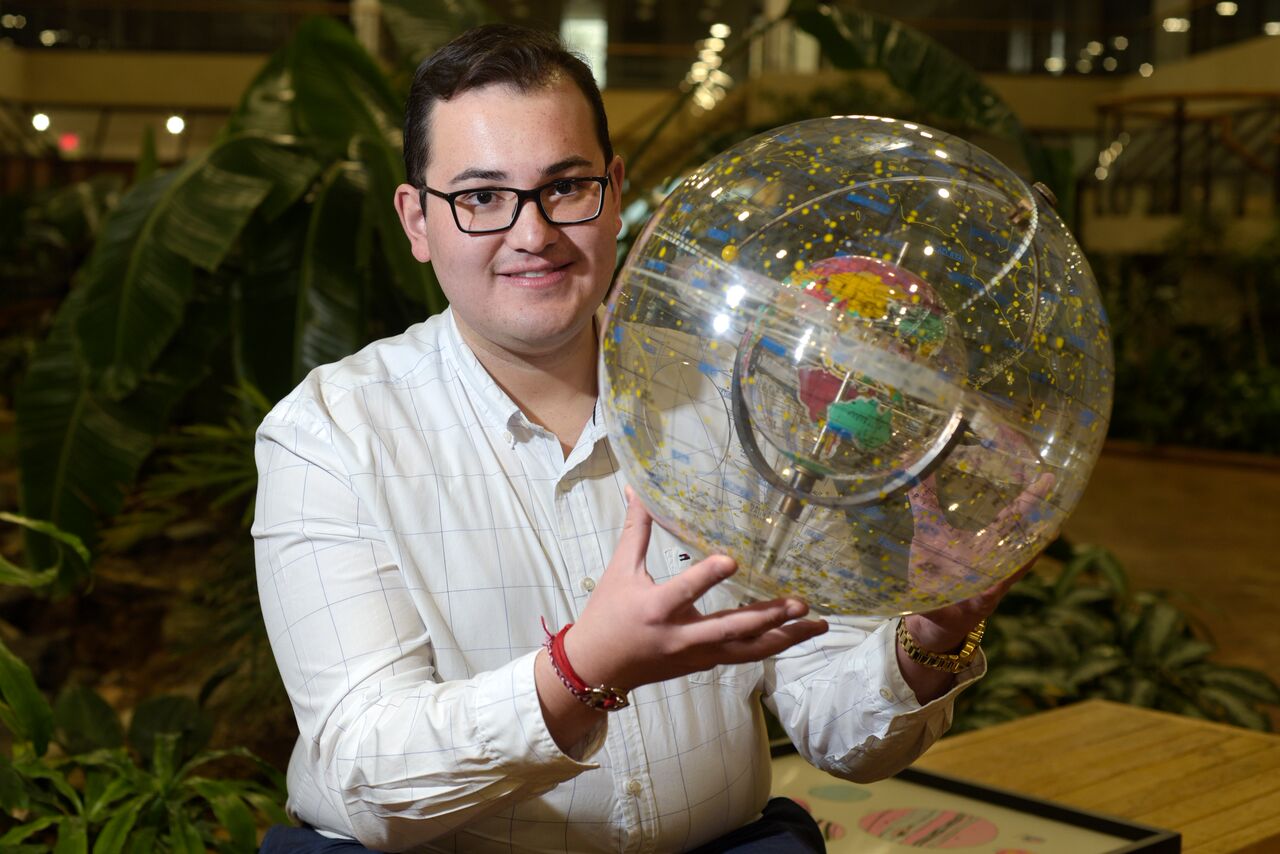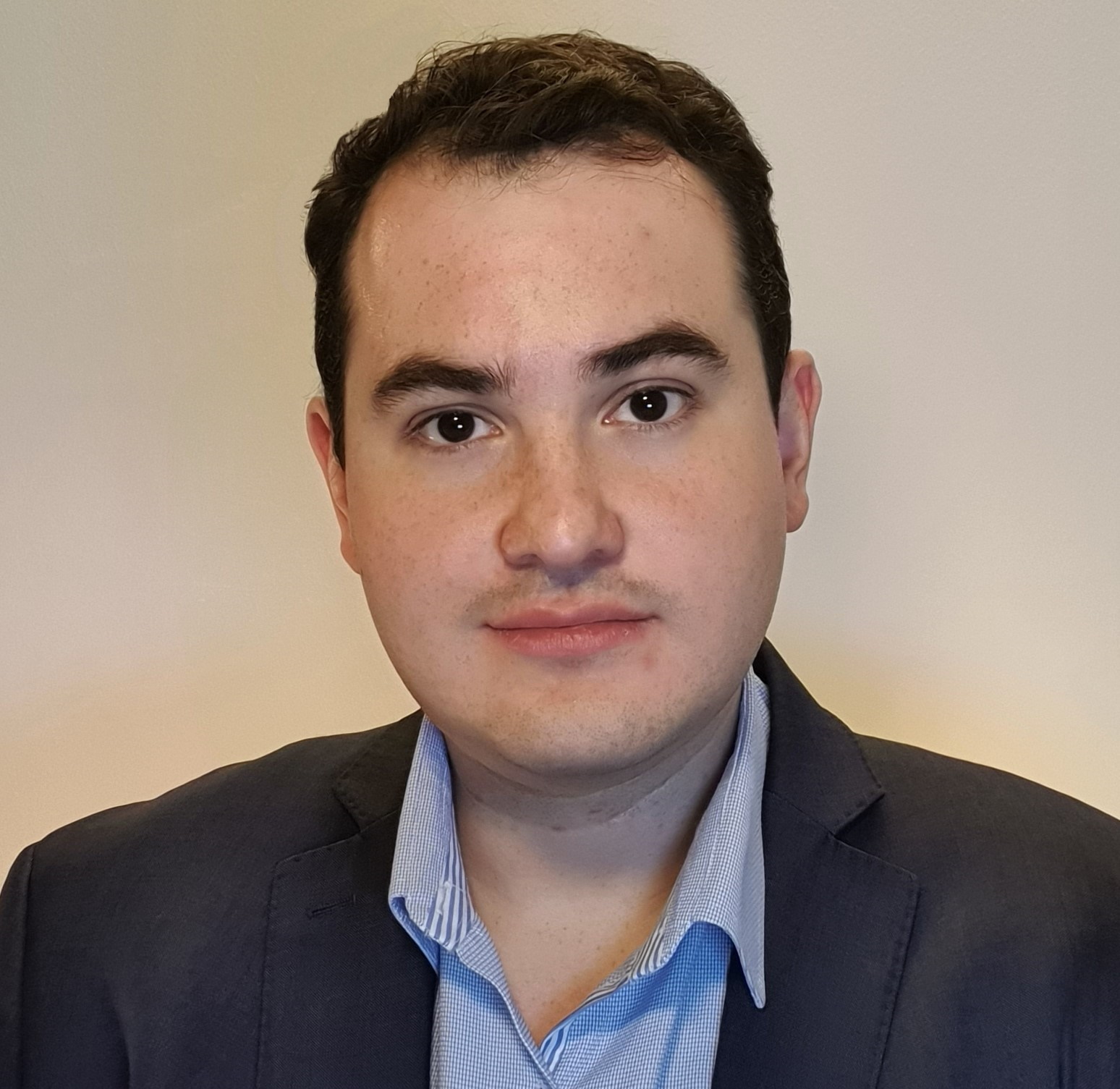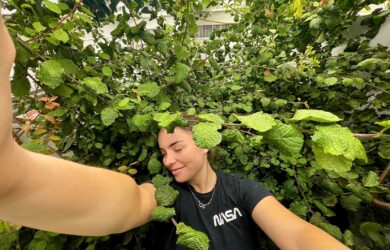
Luis Welbanks will do a PhD in Astronomy focusing on exo-planets.
We are at the start of a huge wave of discovery. We are as close as we have ever been to finding out if there is life on other planets and whether we are alone or not.
Luis Welbanks
An international team of astronomers, led by University of Cambridge researchers, discovered a system of seven potentially habitable planets orbiting a star 39 light years away earlier this year. It was the latest in a string of remarkable recent discoveries of planets outside our own universe which may lead to us finding out sooner rather than later whether we are alone in space.
One person who is seeking to play his part in mapping these discoveries is Luis Welbanks, a Mexican student who starts his PhD at Cambridge in the autumn.
“We are finding more exoplanets than we thought possible,” says Luis. “And we are finding them faster than we expected.”
For his PhD he will look to create an atlas of exoplanets, “a genetic tree classifying the different types” based on the planets’ chemical composition. He will also explore what the chemicals in the atmosphere surrounding the planets can tell us about their creation and evolution and he will research their biological and geological processes. “I will explore, for instance, if they have mountains or oceans, whether they can support life and, if they could, in what way might that life differ from life on Earth,” says Luis. “It is like being one of the first explorers. We are at the start of a huge wave of discovery. We are as close as we have ever been to finding out if there is life on other planets and whether we are alone or not.”
Who we are
As a child living in the outskirts of Mexico City, Luis dreamed of being an inventor and creating things. When he was 13, he was given Carl Sagan’s book Cosmos: a Personal Voyage as a present. He says: “From the first moment of opening the book I became fascinated by the philosophy of science. It was not just about creating something, but discovering something fundamental about who we are.”
His interests were, however, broader than pure science. At his high school, which was linked to the Monterrey Institute of Technology and Higher Education, Luis – who did the International Baccalaureate programme – got involved in theatre production and was passionate about history, even attempting to publish some papers on Mexican history. His interest in history encompassed everything from our recent to our pre-human past. “History was about who we are from understanding our immediate past,” he says, “but physics was about who we are from a more fundamental basis originating in the beginnings of the universe. I wanted to understand where we came from,” he says.
At school he signed up for opportunities to explore his intellectual interests and took part in science summer camps and in an international camp at the Weizmann Institute in Israel.
Double major
When it came to university, he was keen to continue with his dual interests in History and Astrophysics. However, the Mexican system does not allow double majors. So Luis applied to the University of Calgary in Canada. Later, though, he realised that it was better to put all his energies into his passion for science and switched to a double major in Physics and Astrophysics.
Luis’ studies were funded by a scholarship, but this was not renewable after the first year and he spent his first summer vacation in limbo waiting to hear about funding for the next year. There were around 10 other Latin American students in the same situation. Only two, including Luis, got funding for the next year. “It felt a bit like the Hunger Games,” he says. “We were forced to fight against each other for funding.”
Luis and his fellow students felt there needed to be a voice for Latin American students at the University so, at the end of their first year, they started a student organisation to campaign to have Latin America as a main focus in the University’s international statement and to argue for more attention to be given to both recruitment and retention of Latin American students. “We had been a very close knit community and we didn’t want others to go through losing that sense of community,” says Luis.
The group contacted government representatives from Latin America and in the Mexican Foreign Affairs Ministry which eventually resulted in a new scholarship being set up for Mexican engineering students.
The organisation also provided mentoring and tutoring to incoming students facing difficulties adapting to a different educational and cultural context and they set up a Day of the Dead competition which showcased Latin American history and culture in liaison with the Mexican consulate. There were also other events, such as a speaker series. Luis was President of the organisation for five years.
Over the course of his degrees, he developed vital research skills, for instance, he worked on molecular spectrostropy, the study of absorption of light by molecules. This helped him with research into the components of one of Saturn’s moons. He participated in student research aimed at launching a sounding rocket and went to Norway to study the Northern Lights. Luis also restarted a physics student society which brought undergraduates together with graduate students and faculty. One of his initiatives was a contest which involved writing a research paper in the space of 48 hours. Luis says the society helped him get a foot in the research door.
Neutron stars
He completed his joint degrees in 2015 and started a two-year master’s in Astrophysics. At the end of 2015 there was a luminous explosion in the sky which was initially thought to be a supernova except for the fact that it was 200 times brighter than a regular supernova. It was thought that it might be a double explosion. Luis was fascinated and his master’s thesis is an investigation of the physical processes that might have caused this and their chemical signatures. His hypothesis is that the double explosion may have been caused by the explosion of a neutron star, a Quark Nova, following the supernova explosion of a star. Neutron stars are created when giant stars die in supernovas and their cores collapse. A Quark Nova is the explosion of a neutron star into a quark star, a really dense object composed of the smallest particles known to humans, quarks.
Luis had also been developing an interest in exoplanets and how they have formed over the last few years.
Because of his interest, he started reading up on research on exoplanets and contacted Nikku Madhusudhan at the University of Cambridge to see if there were any research posts going at the Cambridge Exoplanet Research Centre. The University has been leading research on exoplanets for the last 20 years. “I wanted to learn from the best in the field, from those who have revolutionised the way we understand exoplanets,” says Luis, who will be based at Churchill College.
He will move to the UK in the summer with his partner and says he is very grateful for the Gates Cambridge Scholarship, especially given his past issues over funding. He feels passionately about its mission to improve the lives of others. “I really want to make a difference,” he says. “I want to share what I have learned. There is not a lot of support for science in Latin America. I want to help empower Latin Americans.”

Luis Welbanks
- Alumni
- Mexico
- 2017 PhD Astronomy
- Churchill College
My experience in life taught me not to conform with the stereotypes imposed by those in power. I believe that every person can achieve greatness and should be allowed to fulfill their dreams. Being a Mexican, I see science as the means to take down the walls built by those trying to divide us, empower people to make informed decisions and appreciate that all lives have equal value. My passion for science transformed into a deep curiosity to understand our universe and the conditions that allowed for our existence. My desire to understand the world took me from Mexico to Canada where I became the first person at the University of Calgary to finish two majors in physics and astrophysics in four years. Later, I joined Dr. Rachid Ouyed and his group to study the Quark Nova, its astronomical signatures and implications. Now in Cambridge, I am honoured to join Dr. Nikku Madhusudhan and his group in studying and characterizing the atmospheres of exoplanets. We are as close as we have ever been to understanding our place in the universe and the uniqueness of our existence. The quest for habitable planets thrills me and I believe that this excitement is shared with the rest of humanity. My path to becoming a Gates-Cambridge scholar has not been linear and I owe a large amount of gratitude to every person who believed in me and helped me become who I am. I hope this opportunity will allow me to inspire others to pursue their goals and create scientific opportunities in Latin America.
Previous Education
University of Calgary












